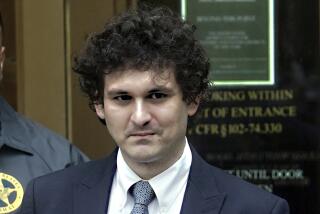Where Was the Wisdom of Salomon? : A highflying brokerage house gets burned trying to corner the market
- Share via
At times the greed on Wall Street is shameless. Now we have revelations that traders at the highflying New York brokerage house of Salomon Bros. wantonly compromised the integrity of the $2.2-trillion U.S. government securities market. Company officials have admitted to illegal bidding for Treasury securities in an attempt to corner the market. Salomon played its money game for bigger profits--but it could undermine confidence in the world’s biggest securities market where the Treasury raises the billions needed to finance the U.S. deficit.
The Salomon scandal--only the latest to rock international financial markets--sheds light on the obscure and highly concentrated trading of Treasury bills, notes and bonds. It’s a business that needs some “sunshine”--additional regulation to keep abuses in check.
Salomon is the oldest member of a select group of 40 “primary dealers”--brokerages and banks that buy securities from the federal government and then resell them to customers at a daily volume of more than $100 billion a day. Salomon has admitted to violating rules that prohibit dealers from buying more than 35% of government notes and bonds at a Treasury auction. The rules are designed to keep one bidder--Salomon is a huge player--from dominating or rigging the market. That’s important because interest rates on government securities affect other rates such as home mortgages.
What makes the scandal at Salomon particularly reprehensible is that the company’s top three executives knew of wrongdoings since April and did not notify regulators until Aug. 9. All three--John H. Gutfreund, Salomon’s chairman and chief executive officer; Thomas W. Strauss, president, and John W. Meriwether, vice chairman--resigned last weekend.
The Treasury quickly suspended Salomon from government auctions, but later modified the order to allow the brokerage to bid for itself but not for its customers. No charges have been filed, but the firm is under investigation by Treasury, the Justice Department and Securities and Exchange Commission. If Salomon is found to have manipulated the market, it should be severely penalized. In a measure of damage control, Warren E. Buffet, the billionaire Omaha investor who has earned a reputation as “Mr. Clean” on Wall Street, is running Salomon on an interim basis.
Before its August recess, Congress was debating renewal of the Treasury’s authority to regulate the trading of government securities. The Government Securities Act of 1986 fell short of setting rules for Treasury dealers’ sales and trading practices. If nothing else, the Salomon affair demonstrates the need for more oversight.
More to Read
Inside the business of entertainment
The Wide Shot brings you news, analysis and insights on everything from streaming wars to production — and what it all means for the future.
You may occasionally receive promotional content from the Los Angeles Times.










